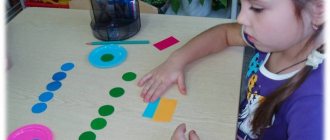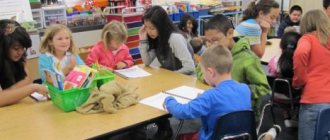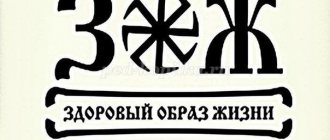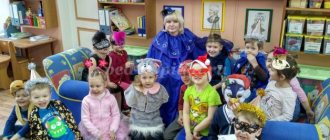Goals:
Identify the acquired knowledge, ideas, and skills that children acquired during the school year. Improve the ability to correlate numbers with quantities, compare aggregates and establish equality between them; Improve knowledge about geometric figures and the shape of objects; Improve the ability to analyze objects and isolate the odd one from the presented series according to a characteristic feature; Develop mental operations, attention, the ability to navigate in space, compare objects by size, understand the independence of numbers. To develop children's curiosity, mutual assistance, self-esteem skills, gross and fine motor skills.
Equipment:
Demo material:
Pictures for a dynamic pause, pictures of “geometric flags”, pictures of “who is the odd one out at the table?”, pictures for gymnastics for the eyes.
Handout:
Worksheets include geometric trees, geometric houses, geometric swings, geometric fishing. Scissors, glue, sheets of paper, geometric shapes cut out of colored paper. Colored pencils, fans with numbers, pictures with images of geometric shapes with a given color for each shape for coloring.
Progress of the lesson
Greeting game “Our smart heads”
Our smart heads will think a lot, cleverly. The ears will listen, the mouth will speak clearly. Hands will clap, Feet will stomp. Our backs straighten, we smile at each other.
Game situation “Journey to the land of geometric shapes”
— Today we will take a trip to the land of geometric shapes. What geometric shapes do you know? Circle, oval, triangle, rectangle, square are plane figures. There are also three-dimensional figures - a cube, a ball, a cylinder. In geometric country, geometric shapes are everywhere.
Quantitative and ordinal counting, numbers
Exercise "Geometric trees"
In front of you are trees with crowns that look like geometric shapes. Count how many trees there are in the picture? Five trees. Show a tree with a crown that looks like a circle (oval, triangle, rectangle, square). What type of tree has a round crown (oval, triangular, rectangular, square)?
Magnitude, numbers
Exercise “Geometric houses”
— Consider the houses of a geometric country.
What do you think, which geometric figure lives in which house? Whose house is the tallest (lowest)? Whose house is the widest (narrowest)? Whose house does the longest (shortest) path lead to? Show on the fan the number indicating the number of floors in a square house (rectangular, triangular).
Orientation in space
Exercise “Arrange geometric shapes on a sheet”
- Now turn the sheets of paper over to the back, clean side and prepare cardboard geometric shapes for work.
Place the square in the upper right corner. Place a circle in the middle of the sheet. Place a triangle in the lower left corner. Place the oval in the upper left corner. Place a triangle in the lower right corner.
Dynamic pause “Count and do” How many triangles are in the green Christmas tree, How many bends can you immediately perform. (3)
How many oval pies are on the plate, immediately perform the same number of jumps. (5)
How many rectangular glasses are there for guests? Do as many squats as quickly as possible. (4)
How many round vases are there on the shelf? Clap your hands as many times as possible. (1)
How many square flags they hung for us, how many turns you need to make now. (2)
Thinking
Didactic game “Who’s the odd one out at the table?”
- What do you think is the odd geometric figure on a round table? What figure do you think is the odd one out on a polygonal table?
Number independence
Exercise “Geometric flags”
— Which square flags are larger, blue or red? There are equal numbers of them. This means that the number of flags does not depend on their color. Which rectangular flags are more numerous, small or large? There are equal numbers of them. This means the quantity does not depend on the size. Which triangular flags are larger, those lined up in a circle, or those lined up in a row? There are the same number of them. This means the quantity does not depend on the location.
Comparison of populations
Exercise "Geometric swing"
— Geometric shapes ride on swings. On the left side of the swing, place three circles to ride. And on the right side plant ovals, one less than circles. What can be done to make the number of circles and ovals equal? Add one oval or remove one circle.
Fine motor skills, eye
Exercise “Catch a fish”
- Place a pencil dot in the middle of each fish and connect this dot to the hooks.
Gymnastics for the eyes “Find an object similar in shape”
- Find with your eyes an object similar in shape to a triangle (circle, square, oval, rectangle).
Cutting out “Geometric shapes” with scissors
— How to make triangles from a square using scissors? How to make squares from a rectangle using scissors? How to make two semicircles from a circle?
Design "Geometric picture"
— Make a picture from the geometric shapes you have obtained and paste it on a sheet of paper. This picture will remind you of a trip to the land of geometric shapes.
- And take home this coloring book. (A picture with an image made up of geometric shapes with a given color for coloring each shape).
MAGAZINE Preschooler.RF
Final summary of GCD in mathematics for the middle group “Bear visiting the guys”Section “Formation of elementary mathematical concepts” (middle group)
Municipal preschool educational institution "Kindergarten No. 70"
Educational field. Cognitive development.
Prepared and conducted by teacher gr. No. 3: Goruleva E. E. Yaroslavl, 2021
Goal: to identify the level of knowledge of children by the end of the year.
Tasks:
- To consolidate children's knowledge about the seasons and time of day.
- Strengthen knowledge of quantities (wide-narrow, long-short, high-low, big-small).
- Continue to develop children's knowledge about the properties of a square (4 sides, all sides are equal, all angles are equal).
- Improve your orientation skills on a sheet of paper.
- Practice counting to 5 and back and correlating quantitative counting.
- Reinforce children's previously acquired knowledge.
- Teach children to answer the teacher’s questions coherently. Expand children's vocabulary.
- Cultivate curiosity and interest in cognitive activities.
Demonstration material: a bear, an envelope with tasks, pictures with seasons and parts of the day (in the form of a presentation), pictures for comparison and orientation in space (in the form of a presentation).
Materials: counting sticks for each child, cards with numbers from 1 to 5 for each child, cut-out geometric shapes, a basket of candy (for a surprise moment).
Progress of the lesson:
Guys, let's say hello:
Let's stand side by side, in a circle, Let's say "Hello!" each other. We are not too lazy to say hello: “Hello!” to everyone! and “Good afternoon!”;
If everyone smiles, a good morning will begin.
- GOOD MORNING!!!
Educator: Guys, do you like to solve riddles? (children's answers) Then listen carefully to the first riddle:
* He slept all winter in a fur coat, sucked his brown paw, and when he woke up, he began to roar. This is a forest animal... (bear)
That's right, it's a bear. So Mishka came to visit us today. He slept for a long time, and now he woke up and cannot understand what time of year it is?
Bear: Hello guys! Tell me, what time of year is it now? Maybe it's not time for me to wake up? I'm completely confused.
Educator: Well, guys, let’s help our bear figure it out and prove that it’s spring now? (children's answers) And so that Mishka understands and remembers better, I will ask questions, and you will answer them. And so: by what signs will we determine that spring has come? What time of year do Bears sleep? What time of year do they wake up? What will happen after spring? And after the summer? What spring months do you know? Well, Mishka, did the guys help you figure out the time of year?
Bear: Of course, thank you guys for your help. I slept so sweetly all winter and had different dreams. And then one day I had a dream with riddles, games and math assignments. I remembered them and wrote them down on a piece of paper, and then hid them in an envelope so as not to lose them. Let's open the envelope and see what tasks are there. Here is a piece of paper, and there are riddles on it. Listen carefully!
* Bears and elephants are sleeping. The hare and the hedgehog are sleeping. Everyone around us should fall asleep. Our children too. When is everyone sleeping? (at night)
* The bright sun is rising, The cockerel is singing in the garden, Our children are waking up, They are getting ready for kindergarten. When does this happen? (in the morning)
* The sun is shining brightly in the sky. The children went for a walk. When does this happen? (in the afternoon)
Educator: Well done guys, you solved all Mishka’s riddles. Our guys are not that easy to confuse. But even our know-it-alls need rest, let’s take a little rest and do a warm-up. Guys, what time of day do we do exercises? (children's answers) And you, Mishka, get up with us for exercise.
Physical education minute.
The cubs lived in the thicket, (walking) they turned their heads. Like this, like this, (circular movements of the head) They turned their heads.
The cubs were looking for honey, They rocked the tree together (raise your arms up and bend to the right and left) Like this, like this, They rocked the tree together.
And then they walked. (walking on a bear) And they drank water from the river. Like this, like this, And they drank water from the river (body bends forward).
And then they danced (springs with the body turning left and right), raised their Paws higher (jumping, clapping their hands at the top) Like that, like that, raised their Paws higher!
Educator: Well, Mishka, show us what else interesting things did you dream about?
Bear: I dreamed about the “finish the sentence” .
Educator: Okay Misha, let me help you. Guys, I will start the sentence, and you will finish it. I think you can easily cope with this task. (Presentation: 2 pictures for comparison)
- What size is a watermelon? (big). And the apple? (small);
- What is the width of the scarf? (narrow). What about a towel? (wide);
- How tall is this house? (high). And this house? (short);
- How thick is this rope? (thick). And this one? (thin);
- What is the length of the girl's hair? (long). What about the boy? (short).
- Which side is the square on? (on right). What about the triangle? (left);
- Where is the rectangle? (up). What about the circle? (at the bottom).
Bear: What great guys you all are, you won’t get confused in anything. I also really like to play and brought the game “Make a Figure” . Listen carefully to the task: “You need to divide into two teams (the teacher will help us). One team goes to this table, the other team goes to this table. There are cut geometric shapes on the tables (let's remember what geometric shapes do you know? (children's answers) your task is to collect geometic shapes from cut cards). One, two, three, start the game .
Bear: Well done guys! We had a great time playing together.
Educator: Yes, bear, our guys have learned a lot this year and are ready to move to the senior group. Are you guys ready to move to the senior group? (children's answer)
Bear: And we’ll check this now, I have one more task, the most difficult one, first, sit down at the tables and listen more carefully: “There are counting sticks in front of you, open them and count out four green sticks. Look, are the sticks the same length? What geometric figure can be made from four sticks of the same length? (square)
Please make a square using counting sticks. Now let's count how many corners a square has and raise the corresponding number? (children's answers). Fine. Now put the sticks in a row. How many sticks must be added to make five? Let's count the sticks (from 1 to 5). Now let's count backwards.
Educator: Well done, guys, you completed all of Mishka’s tasks. Clap for yourself!!! Well, Mishutka, did you like it in our kindergarten? Come to us with new games and tasks!
Bear: I’ll definitely come, and for the fact that you guessed all my riddles and completed all my tasks, I want to give you a basket of sweets. Goodbye, guys! Until next time.
| Next > |





